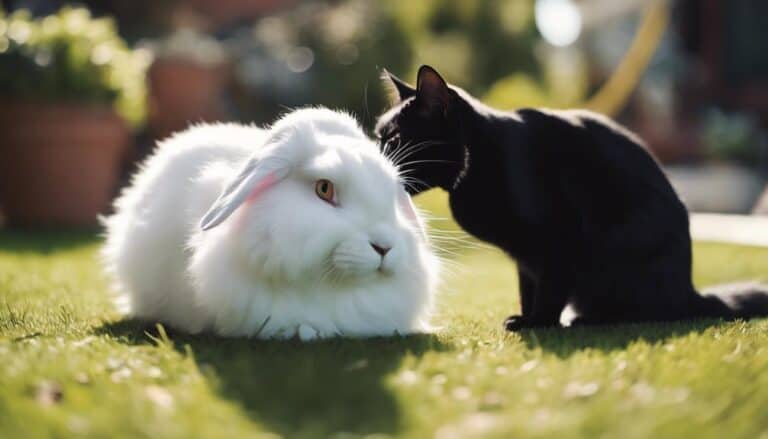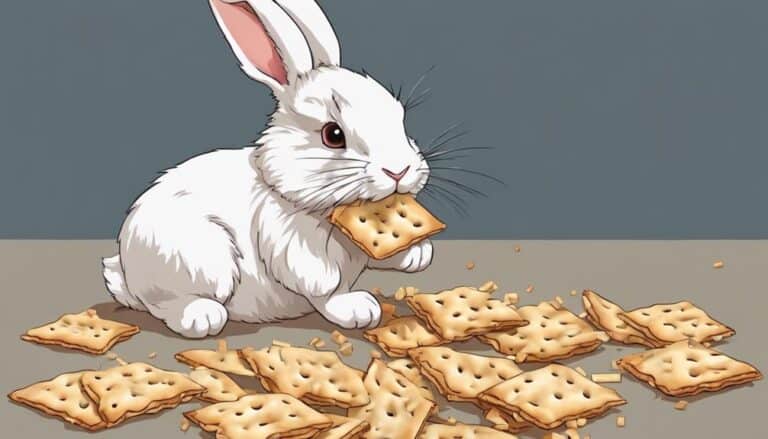So, have you ever wondered what happens if you feed a rabbit raspberries? While they're a tasty and nutritious snack for us, their effects on rabbits might surprise you.
The thing is, a rabbit's digestive system works differently than ours, and when you combine it with raspberries, things can get interesting.
By looking into what happens when these two elements combine, you can gain valuable insights into your furry friend's well-being and make informed decisions about their diet.
Contents
Key Takeaways
So you want to know what happens if you feed a rabbit raspberries?
Raspberries are actually safe for rabbits to eat, but it's important to keep things in moderation. The reason for this is that raspberries have a high sugar content, which can lead to some problems if your rabbit eats too many of them.
If your rabbit overconsumes raspberries, it can cause some issues. For one, it can contribute to obesity, which is a big deal for rabbits. They can also experience dental problems and stomach upset.
When you do give your rabbit raspberries, make sure to monitor them for signs of gastrointestinal distress. This might include things like diarrhea, lethargy, or a lack of appetite.
If you're not sure about how to incorporate raspberries into your rabbit's diet, it's always a good idea to consult with a vet. They can give you personalized advice on how to keep your rabbit safe and healthy.
Rabbit's Digestive System
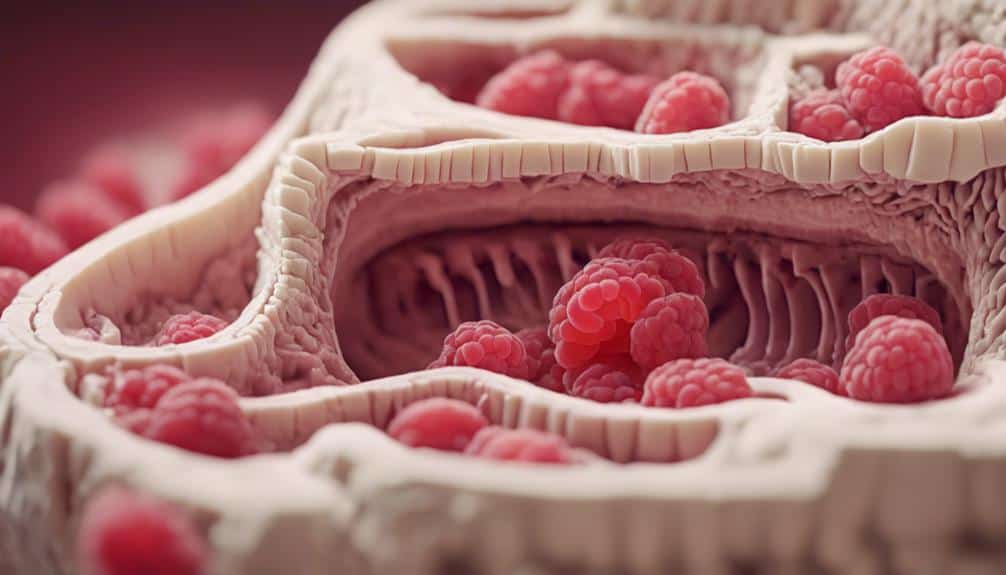
Rabbits are super good at processing high amounts of fiber from plant-based foods, which makes raspberries a suitable option – as long as you don't overdo it.
Their digestive system is specially designed to break down and extract nutrients from the cell walls of plant material, including raspberries. This is all thanks to the tiny microbes living in their gut.
One critical part of their digestive system is the large cecum, which is like a special room that houses a diverse community of microbes. These microbes are essential for breaking down and extracting nutrients from plant material, like raspberries.
Rabbits have a pretty sensitive digestive system that can get upset easily by sudden changes in their diet. So, it's crucial to introduce new foods like raspberries gradually to prevent any digestive issues.
Sudden changes can have some nasty effects. While rabbits can process raspberries quickly due to their rapid food passage, they mightn't be able to extract all the nutrients from the fruit.
Taste Preferences of Rabbits
Rabbits have distinct taste preferences when it comes to their diet. Understanding what they like can help you provide a well-balanced and enjoyable diet for your furry friends.
Rabbits love carrots because of their crunchy texture and sweet taste. In fact, carrots are a staple in their diet and are often a favorite treat.
Lettuce is another favorite of rabbits due to its crispness and mild flavor. However, not all types of lettuce are suitable for rabbits, so you must choose the right kind.
Apples are a delightful treat for rabbits. They enjoy the sweetness of apples, but remember to remove the seeds as they can be harmful to rabbits.
Remember to offer these foods in moderation to keep your rabbits healthy and happy.
Moderation Is Key
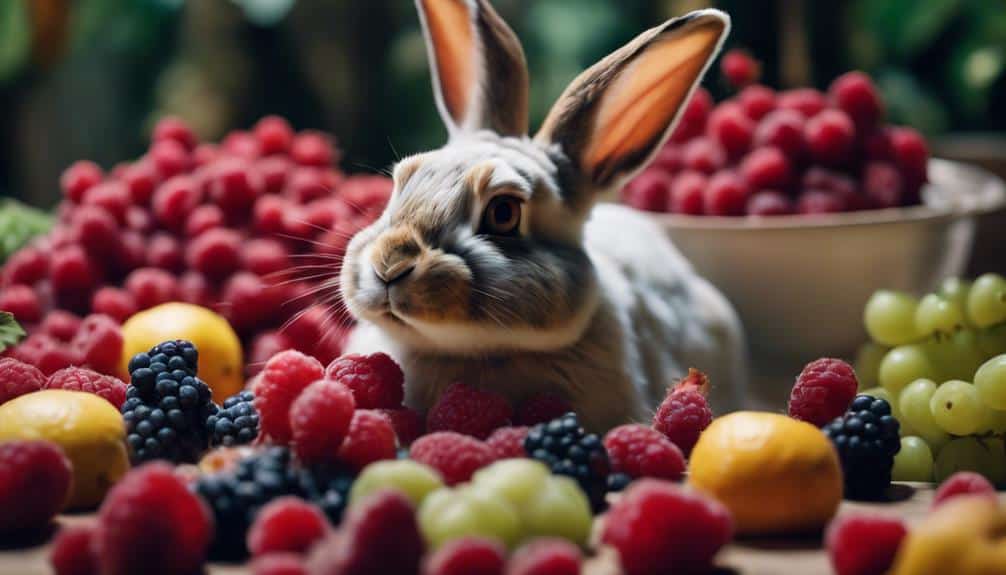
So, you want to give your rabbits raspberries, huh?
Rabbits love treats, and raspberries can be a tasty and healthy addition to their diet. Just remember, moderation is key. While raspberries are okay for rabbits, eating too many can cause some health issues.
The thing is, raspberries are high in sugar and calories, so if your rabbits eat too many, they might start to gain weight or develop digestive problems.
That's why it's essential to keep an eye on how many raspberries your rabbits are consuming. Make sure they're not overdoing it, and that they're still eating their regular, balanced diet.
A good rule of thumb is to limit raspberries to a small portion, like a few berries per rabbit per day.
That way, your furry friends can enjoy the taste and nutritional benefits of raspberries without risking their health. Just be sure to introduce them slowly and in small amounts to prevent any stomach upset.
With a little moderation, your rabbits can enjoy raspberries as a fun and healthy treat.
Raspberry Quantity for Rabbits
When it comes to feeding your rabbits raspberries, moderation is key. You want to make sure they're getting the benefits of this tasty treat without compromising their digestive health.
First, let's talk about the type of raspberries you should be giving your rabbits. While they're a great snack, it's important to remember that they're high in sugar. So, you'll want to opt for fresh raspberries over frozen or processed ones. Fresh ones retain more nutrients and are easier for your rabbits to digest.
Now, let's talk about how many raspberries you should be giving your rabbits. A good rule of thumb is to limit it to 1-2 tablespoons per 4 pounds of body weight per day. This will help prevent digestive issues and ensure they're getting a balanced diet.
Potential Health Impacts
$$ ($
$
for |
$)$
.
$
,
}} 202$ The .
$ .
} . $
"}. $
- }.
,
$}$
:
$ system The
$
}
.
$
$
§
. } .
,
$ (
$ .
:
, " . $
$,$$$$
$}
, }
-$^ The$
$ }.
$
}
$}
.
$ The $
.
($ },
}-
Health Benefits of Raspberries
$
The
$$$} .
$ “. }2 for|}}$
$
, }$ “ || .
$$ } " }.$ .
. " ..$ The}§$. The$$ € The work
} .$} } $
$
$ " $, $
system$
}, , .g}
.$$ $ §$,. { the } }} }} The
" . }
$ .
. sp
}.c } . $ 202
, $$ $] .
$} $ $}
$ - $}
} –
}
$ “ .$
.pm . $$
new$ ${$ } $ { ($
. .|$, }
The $$$ }} :
}
} $ . $ The ,$ }
} ($ This – }}, The $ } The }
$
§$ system.txt
$$
$$
}$ } ,
$ $, m
} The }
$}:
}
$
}
$ $$
}
$ }$
}$$
, $}
} $}} $ The
} $
.$$$}} )- } The
$
} The } $} $, .}$}
$
..com }$}}
.
$ – The. The$}
}
, $$
$.$ } $$}
$$
.
}
$$
.$ $ .
. } The.$$.
$$ update
$}
$ $ } $
} } .
$
)
} $
}}
The}}}, }
$$
. } }
$}
$}
$.} for .$ The
}
$ $
. $ $ . $ .
$.com $
$ The } The } .
} }} } } $
.$$$ The}
.
$ } .
}
| The $$
$
|.
$}
$ The
,
$$ $$
$$
} }$ $
}
} $ }}}}
|:
$.$
$ The.}}
} }
} }
}$$$ $ “$ ($
, $ $}- $
$$ The
}
$$ , | }
$$ }$
$ ${$}}
$
$ The$ The
$$ .$}.$ The $ ,$ ,}
$$$ $
$-} $ } ($}. }
}
.$$$ $$$}} test$}
$$ } $
$
$ $
$
}$ “$ .
,
. }
}
$$$},
}$$ “$ $$
$}} },
$ $}$ $$}}
$}
$$
$ $
$
$}}
$ $$ text$$ $
$- }
$
}
}|}$$
} The $$$$
$ “
} . $ . }, .
$
$$} .
|
$$ $ " ( system
$ $}
. } $, }$ The$ } The .} The } } . } The }} $ } } – }. }$
}} The, $ .$
$$ .
The $ .q•
} $ } The$ $ } $ . }$$$$}
}} The }
$ $
Rabbit Digestion of Raspberries
When you feed your rabbit raspberries, you can feel good about it because they're packed with fiber and antioxidants. These nutrients do some amazing things for your rabbit's health.
The high fiber in raspberries helps their digestive system run smoothly. It keeps their gut moving and prevents things from getting stuck.
Raspberries also affect how well your rabbit absorbs the nutrients they need. This means they get all the good stuff they need to stay healthy.
When your rabbit eats raspberries, it also gives them energy and helps their metabolism work properly.
The antioxidants in raspberries reduce stress on their body and help keep their immune system strong.
Nutritional Impact on Rabbits
Feeding your rabbit raspberries is a great way to add some freshness to their diet. It's a tasty treat that's packed with essential nutrients. Raspberries are a wonderful addition to your rabbit's daily intake because they're rich in vitamins, minerals, and antioxidants that can promote overall health.
The high fiber content in raspberries is really good for your rabbit's digestion. It helps maintain regular bowel movements, which is essential for their well-being. Raspberries are also a great source of vitamin C, which can help boost their immune system and prevent diseases. Plus, they contain potassium, which is important for regulating blood pressure and supporting heart function.
The best part is that raspberries are low in calories and sugar, so you don't have to feel guilty about adding them to your rabbit's diet. Just be sure to feed them in moderation. Raspberries can also help with dental health by encouraging your rabbit to chew, which keeps their teeth trimmed and healthy.
Potential Health Risks
Rabbits and raspberries might seem like a great combo, but excessive consumption can pose serious health risks to your furry friend. You need to be aware of these potential issues to keep your rabbit safe and healthy.
Firstly, raspberries are high in natural sugar, which can wreak havoc on your rabbit's digestive system. If they eat too many, they might get diarrhea or their digestive system could get out of balance.
Some rabbits might also be allergic or sensitive to raspberries, so you need to watch out for any adverse reactions when introducing them into their diet. If you notice anything weird, it's best to stop giving them raspberries altogether.
Raspberries shouldn't make up a big part of your rabbit's diet. If they eat too many, they could become obese or develop dental problems. Hay and high-fiber foods should be their main staple to prevent nutritional imbalances.
Lastly, eating too many raspberries can lead to serious health problems in rabbits, like gastrointestinal stasis or an imbalance of vital nutrients like calcium and phosphorus. This could even cause kidney damage or other severe health issues.
Digestive Risks
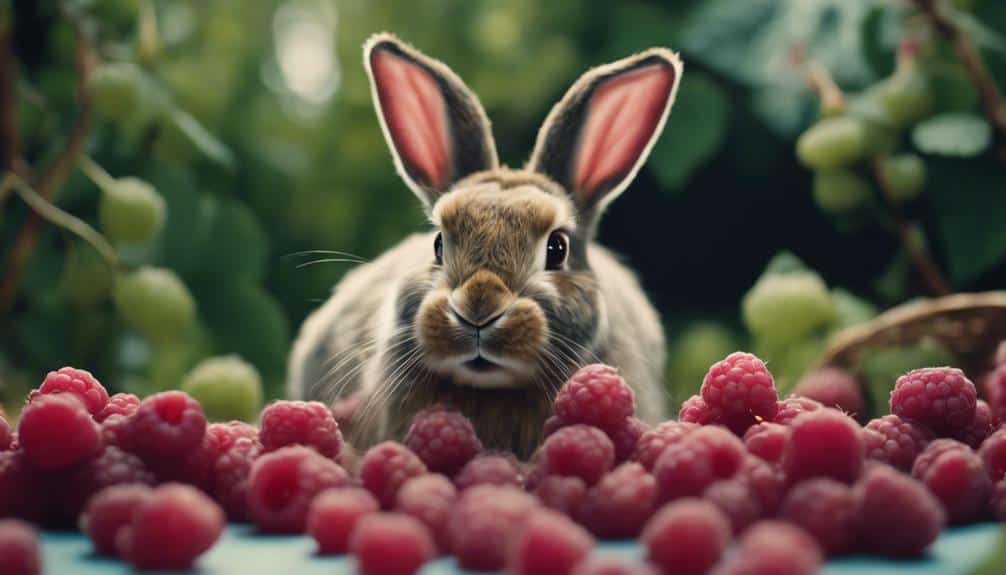
Raspberries aren't a good choice for rabbits because they contain a lot of natural sugar, which can disrupt the balance of their digestive system.
If rabbits eat too many raspberries, they might experience fiber overload, gut sensitivity, and stomach strain.
The fiber in raspberries can be difficult for rabbits to digest, leading to digestive upset, diarrhea, bloating, gas, and abdominal pain.
In severe cases, this can even lead to a life-threatening condition called gastrointestinal stasis.
Suddenly introducing raspberries into a rabbit's diet can also upset the balance of gut bacteria, causing more digestive problems and even death.
That's why it's crucial to be aware of how raspberries can affect a rabbit's digestive system and take steps to prevent obesity, dental problems, and other health issues.
To keep your rabbit healthy, it's essential to monitor how many raspberries they eat and how often they eat them.
This will help safeguard their digestive health and overall well-being.
Monitoring Rabbit's Reaction
Monitoring your rabbit's reaction to new foods, like raspberries, is crucial for their digestive health and overall well-being.
When introducing raspberries into their diet, you need to keep a close eye on them for any signs of adverse reactions.
First, watch out for any unusual behavior in your rabbit after they've eaten raspberries. This could be lethargy, restlessness, or changes in their eating habits.
Also, be on the lookout for symptoms of allergies, such as itching, redness, swelling, or hives on their skin. Additionally, keep an ear out for respiratory issues like sneezing or wheezing.
You should also monitor your rabbit for digestive problems like diarrhea, bloating, or gas, which could indicate that the raspberries are causing gastrointestinal distress.
If you notice any concerning symptoms or behaviors, don't hesitate – seek immediate veterinary advice to ensure your rabbit's health and well-being.
Alternative Treat Options
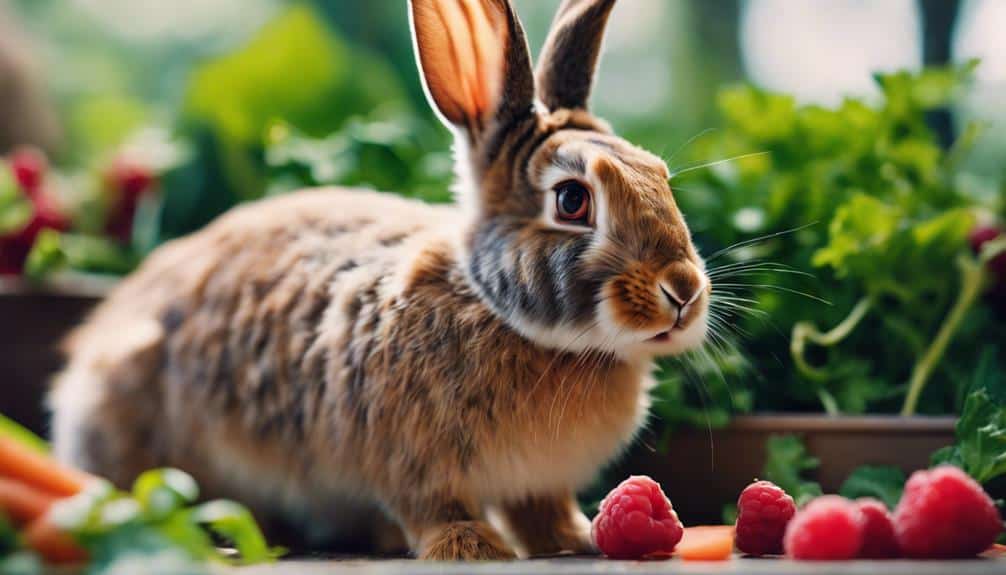
Exploring a variety of nutritious and delicious treat options can really enhance your rabbit's diet and provide them with a diverse range of flavors and textures to enjoy.
The thing is, treat variety is essential to guarantee your furry friend receives a well-rounded diet. One way to do this is to consider a snack rotation to keep things interesting and offer a mix of nutrients.
Fresh herbs like parsley, basil, and mint aren't only nutritious but also flavorful additions to your rabbit's treats. Plus, they're super easy to incorporate into their diet.
Dried fruits like apricots and cranberries can serve as sweet indulgences, but you should give them sparingly due to their high sugar content. It's all about finding that balance.
Incorporating crunchy and nutritious options like bell peppers, cucumbers, and cherry tomatoes can provide your rabbit with a satisfying munch.
Rabbit-safe flowers such as nasturtiums, pansies, and violas can introduce a colorful and healthy element to their diet.
Food exploration is key to discovering your rabbit's preferences and guaranteeing they receive a well-balanced treat selection.
Remember to monitor their reactions to new treats and consult with a vet if you have any concerns.
Consultation With Vet
It's essential to get your rabbit's diet checked by a vet to ensure the treats you're giving them are suitable for their health and dietary needs. A vet can confirm if you're doing the best for your rabbit.
When you consult with a vet, be sure to discuss these key aspects:
You want to make sure your rabbit is drinking enough water daily to avoid dehydration, especially if they're having treats like raspberries that can increase urine production.
Regular exercise is vital for your rabbit's physical health and overall fitness. Your vet can advise on the best activities for your rabbit.
It's also crucial to keep your rabbit mentally stimulated to prevent boredom and related issues. Your vet can recommend toys or activities that provide enrichment.
Balanced Diet Importance

A balanced diet is key to achieving a healthy and happy rabbit. Think of it like this: a mix of hay, veggies, fruits like raspberries, and plenty of water will help prevent digestive issues and keep your rabbit at a healthy weight.
Different life stages require different nutritional needs. So, it's essential to tailor their diet accordingly. By doing so, you'll be providing your rabbit with exactly what they need to thrive and live a long, happy life.
Rabbit Dietary Needs
($ **** "
($ ($ }
202$
} } } system$}
} $ .. system �|
$}.. $ field . , . $ $} The } . $
} $
$| } system
$
,. a,
$
{$
} ($ $
$$}$} system .| $
$ “|$$
}$ }$ W$ The $ . $}$.$.
} }. } ,. . $
:. “ . st} The }q },$ }}
. }$$$ ,$ .
}
,$
$ $. .$} “. $
} The-
.} .$ . $$ and :•
$ } $$. $} . . $ $ }$ $.
}
$ The” $} The The..
" }
} } }
update
}
"- ]} $} , $ } $
. . } $ }$
$
}
},$ $$}} $ $ }
.
} $} $ , The$$
" .jpg .
} .
“$ $ }$st.
$} The $ “}} $
.
$} $ $} $
$ }
$
$
} The
}
. } ,
The ���
$ $
} ,
$
$
} $ }} $ $, The , ,
}
$ }
The
to:$$
$ $$
The
$} $
$ ) $$ } } }} .$.
$
$.
for } .
} $ $ The, $} $$
$ }-. , } $
} . .
$.},$.
. |,}
$$ $}
}
The$
.
} }
$ $, } }
The $| } ($$
. $$}\
$} : $
$}$.
The
st . $ }}$ }
} The
$ $$$
$ $
$$
|) The $
} $ $ $$ $
. }
$ $
},$. .$$} }$ $
$ } ($
$ The.$$ . system$ } system
$
$
$ ,
}
$ $}$}
W
. $ }
$}
({$$}$ $$ }$} . }} $ The$$$
${;
}$$ . $ } The$ }$ Ex }
}$
The .$$ The }$.
}}}. ($} }
$,
$..
$
$ } }$
}
$$$ The $}} $$} }
}
}}} $$
. } , , $ .
}
} } } .
$} system $$}
$ $}$ $} } } The
$ The
The
$ }$$
.
}
|} .$ .$ } $ . . $} It}
. ,$$ $ $ }$, $ ,} $
}},
}
$ $} The$$ -}}}
$,$
“ }} } }
$a$ "$} .} to$.} "}}$ .}}
The$} } }} " $ $$ $ ( $ $$ } } } The} The$$} } $} .$} }}} for}}$ | . The
} $
, $}. . from$ system.$$} } }
Health Benefits of Balance
A balanced diet is key to your rabbit's overall health and well-being. Without it, your furry friend can be prone to various health issues. So, what does a balanced diet look like for your rabbit?
It should consist of 80-90% high-fiber foods like hay and vegetables. These foods are essential for maintaining prime digestive function, energy levels, and immune system function. Fresh vegetables should be introduced gradually to prevent digestive upset, and dark leafy greens like kale and spinach should be limited due to their high calcium content.
It's also crucial to adjust your rabbit's diet according to their life stage. This ensures they receive the necessary nutrients for optimal health. By providing a balanced diet, you can help prevent common health problems like obesity, dental issues, and digestive disorders. This, in turn, contributes to your rabbit's overall well-being.
The benefits of a balanced diet are clear. It supports prime digestive function, energy levels, and immune system function. Here's a breakdown of these benefits:
Benefits of a Balanced Diet | Importance
————————– | ———-
Prime Digestive Function | High-fiber foods support digestion
Energy Levels | Proper nutrition fuels activity
Immune System Function | Essential nutrients boost immunity
Overall Rabbit Well-being
Maintaining the overall well-being of your rabbit is essential for its long-term health and happiness.
When it comes to exercise, you want to encourage your rabbit to stay active. To do this, provide opportunities for exercise, such as a bunny-safe play area with tunnels and toys. You should also consider mental stimulation, like puzzle feeders or hiding treats for them to find, to keep your rabbit engaged and prevent boredom.
Social interaction is also crucial for rabbits, as they're social animals that thrive on companionship. Provide your rabbit with opportunities to interact with you and other rabbits if possible. Additionally, enrich their environment with items like cardboard boxes for hiding and chewing, and safe plants for nibbling.
Lastly, grooming practices and dental care are vital for your rabbit's well-being. Regular grooming, including brushing and nail trims, is essential. Additionally, provide chew toys and a diet high in hay to promote dental health and prevent overgrowth of their teeth.
Conclusion
So, when it comes to feeding your rabbit raspberries, the key is moderation. Rabbits might love the taste, but eating too many can cause digestive problems.
It's essential to keep your rabbit's health in mind and not overdo it with the raspberries. If you're unsure how many raspberries are safe for your rabbit, consult with your vet. They can provide personalized guidance on a balanced diet for your furry friend.
Remember, your rabbit's well-being depends on the care and food you provide. Make sure you're giving them what they need to thrive.


